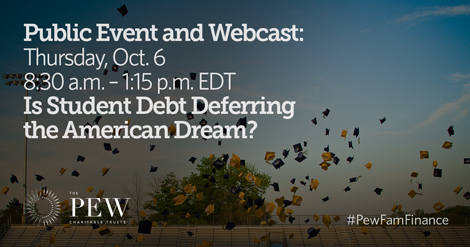Is Student Debt Deferring the American Dream?
A panel discussion about affordable repayment and family financial security
Education continues to be a key driver of financial security for many American households. Research has repeatedly shown that a college degree has a direct impact on upward economic mobility, particularly for those raised at the bottom of the income ladder. However, student debt is a growing burden for many families, causing concern for policymakers at all levels of government.

Increases in enrollment and tuition have contributed to the growth in student borrowing, but the realities of families’ balance sheets also play a central role: Many households earn enough to repay their loans, but a significant share is struggling. The Consumer Financial Protection Bureau estimates that more than 1 in 4 student loan borrowers—10.5 million people—are delinquent or in default.
Please join us in our Washington office Oct. 6 for a series of discussions exploring the state of student loan repayment, the populations that are struggling the most, and options for legislative and regulatory reform. Panelists will discuss:
- How default, delinquency, and the life cycle of loan repayment affect short- and long-term family financial security.
- Whether existing or proposed policies and regulations are adequate to ensure that all borrowers have access to affordable and sustainable repayment options.
Breakfast and lunch will be provided.
Agenda
| 8:30-9 a.m. | Breakfast |
| 9-9:15 a.m. | Welcome and framing remarks |
| 9:15-10:25 a.m. | Panel 1: Why are some borrowers struggling to repay their student loans?
Moderator: Danielle Douglas-Gabriel, The Washington Post Susan Dynarski, University of Michigan Sandy Baum, Urban Institute Sarah Ducich, Navient Deanne Loonin, attorney and advocate for student loan borrowers |
| 10:25-10:30 a.m. | Break |
| 10:30-11:40 a.m. | Panel 2: Which borrowers are most at risk of delinquency and default? Who needs help, and who doesn't?
Moderator: Sarah Sattelmeyer, The Pew Charitable Trusts Jeff Webster, TG Fenaba Addo, University of Wisconsin, Madison Walter Ochinko, Veterans Education Success Stephanie Cellini, George Washington University |
| 11:40 a.m.-12:00 p.m. | Lunch |
| 12:00-1:10 p.m. | Lunchtime panel: What solutions exist, and what’s possible, for at-risk borrowers?
Moderator: Travis Plunkett, The Pew Charitable Trusts Seth Frotman, Consumer Financial Protection Bureau Jason Delisle, American Enterprise Institute Pauline Abernathy, Institute for College Access and Success |
| 1:10-1:15 p.m. | Closing |
The Pew Charitable Trusts makes every effort to comply with federal, state, and local government ethics rules, including when hosting events. Please make sure that your participation is consistent with applicable ethics rules.
901 E St. NW
Washington, DC, 20004



